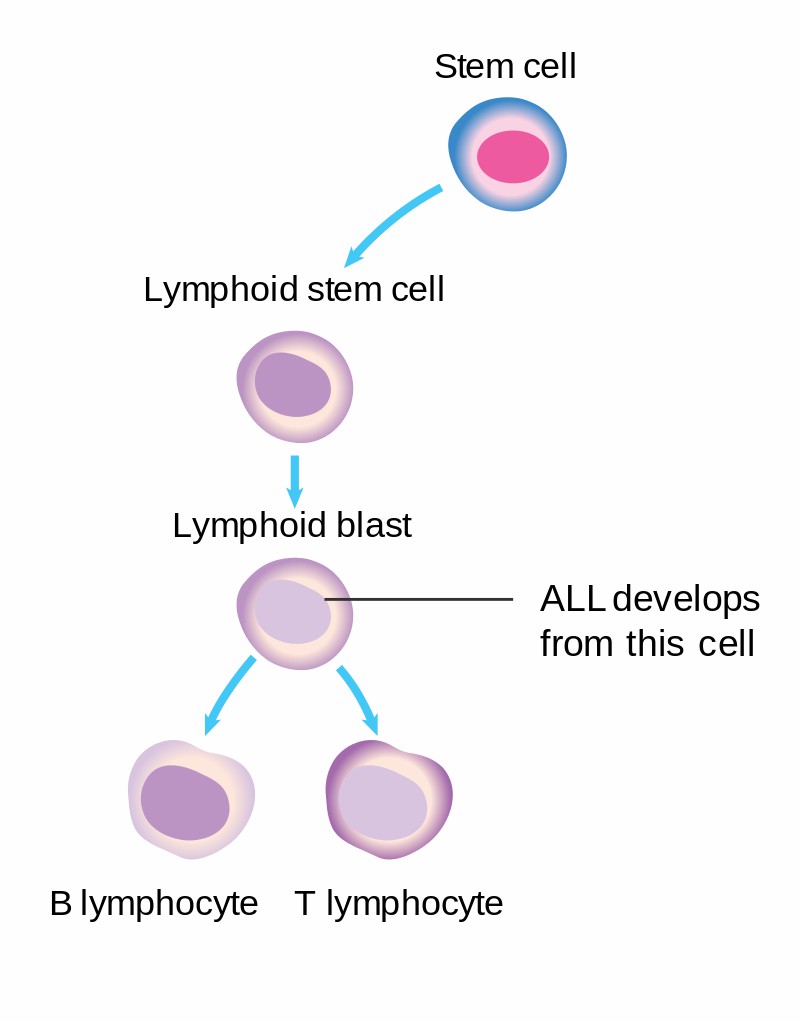Engineering Leukemia Cell BV173 for Self-destruction
Creative Biolabs has established a platform to develop synthetic gene circuits for cancer immunotherapy- turning cancer cells against themselves. We have developed several efficient strategies for engineering BV173 for self-destruction. From project design to systematic assessment approaches, our seasoned scientists will work with you to develop a complete solution according to your special needs.
Introduction of Acute Lymphoblastic Leukemia (ALL)
Leukemia is a cancer of the body's blood-forming tissues, including the bone marrow and the lymphatic system. One type of leukemia, ALL affects a type of white blood cell called lymphocytes, causing them to build up in the liver, spleen and lymph nodes. These white blood cells fight infection and help protect the body against disease. Patients with ALL have too many immature white blood cells in their bone marrow. These cells crowd out normal white blood cells. Without enough normal white blood cells, the body has a harder time fighting infections. This disease is a genetically heterogeneous disease with a 5-year survival of about 40% for adults.
 Distributed under CC BY-SA 4.0, from Wiki, without modification.
Distributed under CC BY-SA 4.0, from Wiki, without modification.
Treatments for ALL
The main treatment for ALL is chemotherapy. However, depending on the subtype of ALL, maybe other treatments are also needed, including a targeted cancer drug, or immunotherapy. Immunotherapy is one type of targeted therapy, which uses drugs to identify and attack specific parts of cancer cells with less harm to normal cells. Some of the immunotherapy drugs used to treat ALL might also be considered forms of targeted therapy because they work by attaching to specific parts of leukemia cells. Monoclonal antibodies and chimeric antigen receptor (CAR) T-cell therapy are two common strategies of targeted therapy. Targeted therapy may be used alone or in combination with chemotherapy. Targeted therapy can be an effective treatment, but it is also associated with a relatively high rate of serious complications. More effective strategies are urgently needed for the treatment of ALL.
Properties of Human ALL Cell Line BV173
BV173 was derived from a patient with Philadelphia chromosome (Ph1)-positive acute leukemia. This cell line retained the Ph1 chromosome and had the morphologic and cytochemical features of undifferentiated blast cells. It lacks the membrane characteristics of mature B- or T-lymphocytes and does not react with monoclonal antibodies to the myelomonocytic cell lineage. BV173 could be used as a good model of ALL, and actually, many studies have been performed using it as the model of the disease.
Engineering BV173 for Self-destruction at Creative Biolabs
Tumor lymphangiogenesis (formation of new lymphatic vessels) plays an important role in prognosis, but there is new evidence that lymphangiogenesis can enhance cancer immunotherapy and boost T cell immunity. Scientists at Creative Biolabs have been engaged in the study of tumor lymphangiogenesis for many years. We are proficient at inspiring the lymphangiogenic potentiation of immunotherapy to Turning Cancer Cells Against Themselves.
BV173 cell line is a useful model in the research of new therapy for ALL. We have developed several different strategies to engineer BV173 for cancer cell self-destruction purposes. Our strategies for engineering cancer cells for self-destruction, include but are not limited to:
Moreover, Creative Biolabs also offers high-quality custom services of Ex Vivo Immune Reactivity Assessment and Toxicity Assessment of self-destruction cancer cells. For more detailed information, please feel free to contact us or directly send us an inquiry.
For Research Use Only | Not For Clinical Use



 Download our brochure
Download our brochure